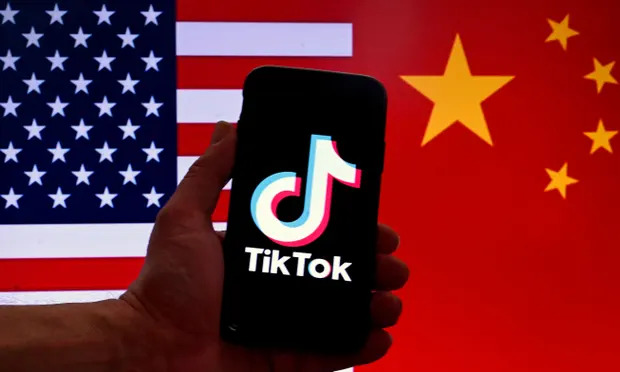Militaries are racing to develop weapons that could one day directly assault or disable human minds. We ignore this broader context at our peril.
 ‘The fight for our minds demands a comprehensive, long-term strategy.’ Photograph: Olivier Douliery/AFP/Getty Images
‘The fight for our minds demands a comprehensive, long-term strategy.’ Photograph: Olivier Douliery/AFP/Getty Images
–
Foreign biometric data collection on Americans is increasing, with users unwittingly providing facial recognition data through TikTok’s filters and games. But the current focus on TikTok shouldn’t blind us to the collection of sensitive biometric data by China through other technology it has deployed in the United States. One example is the Flowtime device, a neurotechnology headset used by many Americans for meditation, gaming and other purposes, produced by Hangzhou Enter Electronic Technology Co, Ltd (“Entertech”), a Chinese-based company. Entertech has also sold tens of thousands of helmets fitted with EEG (Electroencephalography) sensors to the State Grid Corporation of China – a Chinese state-owned electric utility corporation – so it can measure its workers’ fatigue and other brainwave activities in real time on the job. Entertech has accumulated millions of raw EEG data recordings from individuals across the world, along with personal information and device and app usage by those individuals.
The most alarming aspect of cognitive warfare is the development of brain control weaponry. Chinese National Natural Science Foundation-funded scientists have urged China to invest in military brain science (MBS), researching the damaging effects of various weapons on brain tissues and the development of brainwave interference and infrasound weapons. The brain, they argue, is the “‘headquarters’ of the human body” and weapons “[p]recisely attacking the ‘headquarters’” will soon become “one of the most effective strategies for determining victory or defeat in the battlefield”. While the US intelligence community has recently discounted the possibility that Havana Syndrome was caused by a foreign adversary, the US military has been testing pulsed energy on animals to attempt to replicate Havana Syndrome effects.
Addressing cognitive warfare requires a multifaceted approach that goes beyond banning apps like TikTok. We need to move quickly to secure global rights and norms to individuals that secure their right to cognitive liberty, and ensure individuals are entitled the right to mental privacy, freedom of thought, and self-determination over our brains and mental experiences.
We also need to raise public awareness of the risks associated with digital platforms and neurotechnology devices by giving the public concrete information about the risks to themselves and national security. Educating users about potential dangers and promoting digital literacy will empower individuals to make informed decisions about their online presence and the devices they use.
The fight for our minds demands a comprehensive, long-term strategy that combines rights, policy, technology, education and international cooperation. Encouraging open dialogue and transparency among governments, the private sector and citizens will foster trust and facilitate collective understanding of the battle for our brains. By acting now, we can build a robust defense against ever-evolving threats to our cognitive liberty and the integrity of our nation, securing the foundations of the right to think freely for future generations.
- Nita Farahany is the author of The Battle for Your Brain: Defending Your Right to Think Freely in the Age of Neurotechnology (St Martin’s Press 2023) and the Robinson O Everett professor of law and philosophy at Duke University.
–

Topics
Most viewed
- –
- –
- –
- –
- –
-

- –













